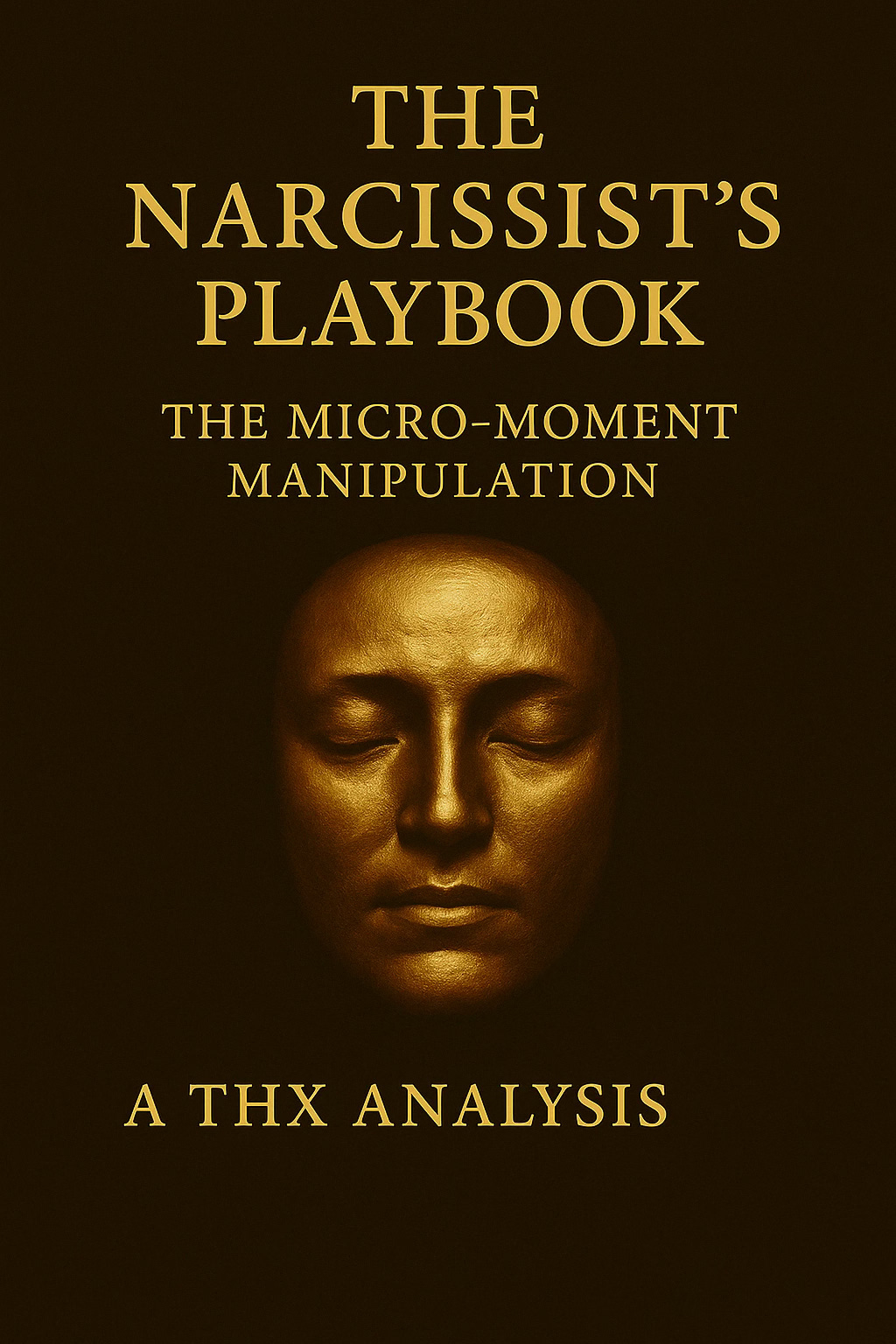Chapter 6: The Micro-Moment Manipulation
From the THX Series Hub: The Narcissist’s Playbook & The Life After
Author’s Note
This post unpacks how narcissists distort micro-moments—those small, emotional cues that shape our perception of safety, love, and trust.
If you're in recovery, this might stir recognition or grief.
Let it ground you—not shame you.
You didn’t fall for the lie. You responded to hope.
How narcissists exploit the little moments that build big trust.
Micro-moments are the invisible architecture of human experience.
The glance that says “I see you.”
The gesture that says “You matter.”
The pause that says “I’m here.”
These tiny cues build safety, love, and memory.
But in narcissistic dynamics, those same micro-moments are strategically distorted—used not to deepen trust, but to destabilize it.
What They Do (and Why It Works)
My Experience:
She was never all bad. That’s what made it so confusing.
She could be tender—right after cruelty.
Generous—right before control.
Affectionate—when I pulled away.
Those little moments kept the hope alive. I’d think, maybe it’s getting better.
But it wasn’t. It was tactical.
The Pattern:
An apology when you’re packing your bags.
A gift after an outburst.
A meaningful glance when you're about to give up.
Each one says: “Don’t trust the bad memory. Trust this good feeling.”
Why It Feels So Real
Micro-moments bypass logic.
They register in your body, your emotional memory, your attachment system.
Even if 90% of your experience is harmful, that 10%—if delivered with precision—creates a false sense of safety that keeps you stuck.
You don’t stay because you’re weak.
You stay because your nervous system is holding out for relief—and they’re skilled at delivering just enough of it to keep you hoping.
The THX Breakdown
Narcissists mimic high-utility micro-moments that normally trigger PERMAH and Admiration:
Emotion Evoked – Tenderness, surprise, nostalgia
Closure (faked) – “I’ll do better,” “We’ve been through so much”
Clarity (temporary) – “I finally get it now”
Consistency (just long enough) – A good week, a vacation, a text that feels like the old days
Speed – Immediate attention when you threaten to leave
But these moments are isolated, not integrated.
They don’t signal real change. They’re bait.
The Whiplash Effect
These moments create a psychological trap:
“If they can be this kind, maybe it really is me.”
“If it was all bad, I’d leave. But it’s not…”
“I don’t want to give up on something that felt this good once.”
This is not indecision. It’s trauma bonding.
Final Words
Micro-moments matter. They shape our sense of self and safety.
But when those moments are manipulated—used to obscure harm rather than repair it—they become dangerous.
You’re not broken for remembering the good.
You’re human.
But healing begins when you stop letting small moments override the whole story.
If the good moments don’t lead to growth, repair, and safety—
Then they’re not roots. They’re bait.

Quick Links
Framework-based essays that decode the patterns, tactics, and predictable emotional logic of narcissistic behavior.
🔹 Chapter 1: The Illusion of Utility
Narcissists appear helpful, generous, and supportive—but what they offer isn’t true utility. This post unpacks how they simulate usefulness to create dependence, and how recognizing what was missing can be the first step toward freedom.
Using the lens of human flourishing, this piece explores how narcissists mimic love, meaning, and growth—not to connect, but to control. When every good thing gets twisted, how do you tell what’s real?
🔹 Chapter 3: Twisting the Admiration Equation
Admiration should feel earned, mutual, and expansive. But narcissists distort it into obligation. This post reveals how they manipulate skill, goodness, awe, and gratitude to extract loyalty—and punish doubt.
🔹 Chapter 4: When Admiration Becomes Worship
This entry shows what happens when admiration is no longer enough. Narcissists demand reverence, punish independence, and expect silence in the face of harm. Love is replaced by performance—and dissent becomes betrayal.
🔹 Chapter 5: Prospect Theory and Narcissism
Why do narcissists explode over small things? This post uses behavioral economics to explain how narcissists experience boundaries, autonomy, and truth as losses—and why they’ll do anything to avoid them.
🔹 Chapter 6: The Micro-Moment Manipulation
Sometimes what keeps us hooked isn’t the big promises—it’s the little moments. This piece explores how narcissists use micro-moments of affection and relief to reset your hope and obscure the harm.
🔹 Chapter 7: RKYC for Survivors
Originally designed as a business tool, “Really Know Your Customer” becomes a healing practice here. This post helps survivors rediscover their truth, needs, and voice—after years of emotional distortion.
A quiet offering for those who stayed too long, left too late, or are still trying to name what happened. This piece honors survivors, holds space for grief, and speaks to the person you used to be.
📖 Author’s Note & Series Closure
This final entry reflects on why the series was written, how the THX frameworks helped decode personal experience, and what it means to move forward—with clarity, dignity, and your story intact.



